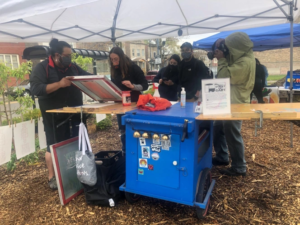DeSantis defends his state’s depiction of slavery; Biden bashes book bans and honors Emmett Till
The 2024 presidential race, nominally a battle to shape the country’s future, is increasingly being consumed by a roiling debate over reexamining, redefining and reimagining its past.
Over the past 10 days, candidates from across the political spectrum have discussed the intricacies of slavery, Reconstruction, military desegregation and lynching — a rare moment in modern presidential politics when Black history has become a more dominant subject than more traditional topics like taxes or crime.
On July 21, GOP presidential candidate Florida Gov. Ron DeSantis (R) defended his state’s new history standards, which suggest slavery had benefits for some enslaved people. Hours earlier, Vice President Harris had traveled to Jacksonville, Fla., to condemn those standards as “propaganda.” Four days later, President Biden proclaimed a national monument for Emmett Till, a Black teen brutally murdered in 1955, using the occasion to condemn “darkness and denialism” from those seeking to “bury history.”
President Biden on July 25 signed a proclamation to establish a new national monument dedicated to Emmett Till and his mother Mamie Till-Mobley. (Video: Jackson Barton, Naomi Schanen/The Washington Post)
Other Republican campaigns, including that of former president Donald Trump, have since entered the fray, attacking DeSantis while espousing many of the same ideals he has pushed about how history should be framed on issues of race.
The political and pedagogical firefight encapsulates a broader debate that has erupted across the country about what to teach about race, history and the intersection of the two. It underscores how the nation’s metastasizing culture wars — now firmly ensconced in the nation’s classrooms — have broadened to strip Americans of a shared sense of history, leaving many to view the past through the filter of contemporary polarization.
“Most of our prior arguments were about who to include in the story, not the story itself,” said Jonathan Zimmerman, a University of Pennsylvania professor who studies the history of education. “America has lost a shared national narrative.”
The conflict has intensified in recent years as America’s historical record on race has increasingly become a battleground for partisan squabbling. It has cost educators their jobs and forced others to self-censor, sent the textbook publishing industry into meltdown and reshaped how students learn about race and racism in classrooms nationwide. As the tensions have spilled from local school board meetings to state legislatures to the White House and now the campaign trail, history has become a defining topic for contenders angling for the presidency.
DeSantis, whose “anti-woke” agenda has put Florida at the forefront of revising how Black history is taught, has come under fire for supporting a set of standards for middle school instruction that include teaching “how slaves developed skills which, in some instances, could be applied for their personal benefit.”
As DeSantis has tried to clarify his position amid a broader campaign reset this past week, the bipartisan condemnation offered an indication that his push may be running into turbulence. Sen. Tim Scott (R-S.C.), who has hailed his African American family’s journey “from cotton to Congress” while extolling the American history that made such upward mobility possible, condemned DeSantis’s argument about the supposed benefits received by enslaved people.
“There’s no silver lining in slavery,” said Scott, who is also seeking the GOP presidential nomination, suggesting that DeSantis should consider clarifying his position. “People have bad days. Sometimes they regret what they say.”
Harris, usually on the opposite side of Scott on matters of racial history and justice, also chastised the Florida governor. Shortly after learning of the standards, she made an impromptu trip to Jacksonville to slam what she called “revisionist history” being peddled in classrooms.
“This is unnecessary, to debate whether enslaved people benefited from slavery. Are you kidding me?” she said July 21, two days after the Florida Department of Education unveiled its new standards. “Let us not be distracted by what they’re trying to do, which is to create unnecessary debates to divide our country.”
DeSantis’s aides snapped back against his critics in both parties, alleging that politicians had taken the proposal out of context and noting that other educational programs also say enslaved people developed skills that they used after the Civil War — at least those who survived slavery and attained some measure of freedom.
The spectacle riveted James Whitfield, a Black Texas principal who recently losthis job for allegedly promoting critical race theory — which some Republicans have turned into a catchall term for lessons about race deemed politically motivated. The furor over the depiction of slavery recalled the competing visions of America and its history that he says led to his dismissal.
“It just made me think of how divided we are,” Whitfield said.
Those divisions have only grown sharper as both parties seek to rally their bases by defending their preferred takes on U.S. history.
While Virginia Gov. Glenn Youngkin was able to parlay angst over schoolroom instruction into a GOP victory in 2021, polling suggests that the views on Black history embraced by DeSantis and other Republicans may be out-of-step with the broader electorate.
Just over half of all adults and about three-quarters of Black adults said they were either “extremely” or “very” concerned about states stopping public schools from teaching about the history of racism in America, according to a Washington Post-Ipsos poll conducted this spring.
Still, the partisan split in the polling — Republicans are far more likely than Democrats to say the legacy of slavery does not affect Black people today, for example — suggests why the issue has become a dominant theme in the contest to secure the GOP presidential nomination.
Eighteen largely Republican-led states have passed laws or enacted policies since 2021 that circumscribe what educators can say about race, history and racism, according to an Education Week tally. Many of the measures are broad, outlawing instruction that could make children feel uncomfortable due to the color of their skin.
A handful of states — most notably Florida — are scrutinizing or rejecting classes and textbooks for what conservatives charge are inappropriate mentions of race. This January, Florida repudiated a pilot Advanced Placement course in African American history, alleging that it lacked “educational value.”
And some blue states are passing laws that take education on race and history in the opposite direction. Since 2019, at least four reliably Democratic states have enacted legislation mandating classes in African American, Latino and Puerto Rican studies.
It all portends hopeless bifurcation, Zimmerman said, suggesting that America is becoming a place where what students learn about the country’s past will depend whether they live in a conservative or liberal state.
Several of the candidates vying for the presidency have pledged to use the power of the executive branch to create new national standards for how schoolchildren are taught about race.
Trump, for example, has warned about “pink-haired communists teaching our kids” and pledged to cut federal funding for schools that teach critical race theory or other “inappropriate” topics about racism.
While debates over how to teach American history are not new — pressure from liberal activists in 1950s and 1960s led to the inclusion of more women and people of color in school lessons, for example — the fight has become particularly fraught in recent years, as a growing number of scholars and politicians seek to draw a more direct link between the past and the present. Much of the fight can be traced to the early days of Trump’s first presidential campaign, when his nostalgic “Make America Great Again” pledge emerged against the backdrop of a burgeoning racial reckoning sparked by the Black Lives Matter movement.
Conservatives contend that instruction on race and history has shifted since then to reflect liberal ideologies and values in ways inappropriate to the schoolhouse. They have advocated returning to a more traditional way of teaching American history, one less critical of the nation’s past flaws and less explicit about linking current inequalities to past injustices.
In Florida this year, volunteers for the right-leaning Florida Citizens Alliance spent weeks combing through social studies textbooks before presenting their findings to the state Education Department. In a 29-page report, the group’s members wrote that textbooks focused too much on slavery and the struggles of Native Americans and Black people — and did not mention “contributions affiliated with white people.”
Keith Flaugh, co-founder and CEO of the Florida Citizens Alliance, said his group’s analysis proves modern-day education means teaching “our kids that our country has been very oppressive.” Speaking of DeSantis, he added: “It’s the reason we’re supportive of what the governor has been doing.”
Officials, educators and activists on the other end of the political spectrum argue that advancing a more comprehensive and accurate record of American history is imperative to addressing the nation’s inequities.
“While darkness and denialism can hide much, they erase nothing,” Biden said Tuesday at an event for the new Emmett Till monument, noting the symbolism of Till’s mother opening her son’s casket to show the world his mutilated body. “For only with truth comes healing, justice, repair and another step forward toward forming a more perfect union.”
Rashad Robinson, president of Color of Change, an advocacy group that has a Black History Now initiative, said America’s racial history is being used as a tool to determine who should have power in the country and which communities are prioritized.
The dueling American histories “are about not just what has happened, but what we do about it going forward,” he said. “If you can tell a story that removes the harm that has been done, if you can tell a story that removes the violence, that removes the disenfranchisement, that removes the targeting of certain communities — then what you do is you change the way we believe we have to deal with it.”
Trump campaigned in 2015 and 2016 with the MAGA slogan that nodded to a period before a more diverse and racially conscious set of actors began reshaping the nation’s culture. During his presidency, he embraced of some of the views espoused by white nationalists wishing to honor — or reestablish — that bygone era from America’s more racially homogenous and stratified past.
Among Trump’s most striking proposals was one for a “National Garden of American Heroes” filled with statues of historical figures of his choosing, including former Supreme Court Justice Antonin Scalia and evangelical leader Billy Graham. The proposal, which included five Black Americans, was in part a response to the movement to remove Confederate statues across the country.
Events during Trump’s presidency — including a deadly white-supremacist rally in Charlottesville, the murder of George Floyd and the publication of the New York Times’s 1619 Project reexamining the role of slavery in America’s founding — propelled the country toward a cultural conflagration over the idea that America’s history of systemic racism was still affecting minorities today.
That concept gained broad national appeal in the aftermath of Floyd’s death, as communities and companies sought to grapple with the idea of ongoing institutional oppression of Black Americans. Various institutions embraced the Black Lives Matter movement and sought to take actions aimed at acknowledging and curing past injustices. The movement was especially potent among liberals, and then-candidate Biden reoriented much of his campaign in the summer of 2020 to focus on “equity.”
In recent months, Biden and Democrats have rekindled some of their public passion over race issues. The move has been welcomed by some advocates, who say Democrats began paring back their race-conscious agenda in the aftermath of Youngkin’s win in 2021, amid a backlash against calls to “defund the police” and the Black Lives Matter movement in general.
A string of recent activity — from a Supreme Court decision striking down college affirmative action programs to mass shootings by white supremacists to book bans by some Republican officials — has propelled the issue back to the forefront of Democratic agenda.
With Republican presidential candidates locked in a crowded primary race in which they are aiming to appeal to the base voters loyal to Trump, both sides see a potential political upside to exhuming the most contentious portions of the country’s history.
In some cases, the debate is taking place literally in the public square.
After the 2020 protests over Floyd’s murder, more than 160 Confederate memorials were removed, relocated or renamed, according to the Southern Poverty Law Center. Still, a January 2022 report found that there were still 723 monuments and 741 roadways dedicated to Confederates, as well as hundreds of schools, counties, parks, buildings and holidays.
The framing of public and historic spaces is particularly important at a time of disunity over the evolving school curriculums, said Brent Leggs, executive director of the African American Cultural Heritage Action Fund, which is working to preserve or designate historic Black homes, churches, statues and other landmarks
“There are states that can remove history from a textbook, but they can never destroy the physical places where history happened,” Leggs said. “Historic preservation is all the more important at this moment in our history, and through our work, we can ignite both a cultural reckoning and cultural renaissance.”
Scott Clement contributed to this report.




